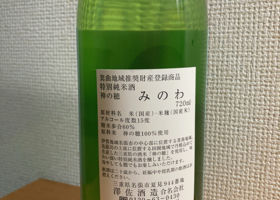Timeline
いーじーPurchased at a sake shop.
I had wanted to try this hiyaoroshi for a long time.
The rarity is high.
Drink it cold.
Fresh and very fruity. I didn't feel much hiyaoroshi-like flavor, but it has some richness and depth.
The aftertaste is fruity sweetness like orange peel, sourness, and bitterness. The aftertaste is normal.
We had it with sashimi of yellowtail from Nagasaki Prefecture. It is a must with autumnal delicacies.
Even sake beginners can enjoy its taste. いーじーPurchased at a liquor store.
It is a sake brewer that is not often seen even in Kansai. I think its rarity is very high.
At room temperature.
It has a strong ginjo aroma characteristic of sake.
The first sip has a heavy body and acidity. The aftertaste is long.
The robust flavor and deep aftertaste may be the best among the Mie sake I have ever tasted.
After the second sip, the mouth gets used to the taste and the acidity fades.
It goes well with nabe (hot pot) and other dishes with strong flavors.
Suitable for intermediate and advanced sake drinkers. いーじーPurchased at a liquor store.
It is a summer sake from Mitsui no Kotobuki, a famous sake brewer in Fukuoka. The cicada on the label is impressive and I was finally able to purchase it this time.
The rarity is a little high.
Cold sake.
Slightly fruity aroma.
The soft water gives it a refreshing taste. Sweetness is stronger than acidity.
Light-bodied and modern. The aftertaste is normal.
When I meditate, I see a countryside landscape with a fresh breeze. The sound of cicadas in the distance from the woods is of ming-ming-zemi, the sound of cicadas.
A taste that can be enjoyed by beginners of sake. いーじーPurchased at a liquor store.
Amabuki, which I have had several times. Rarity is high in some areas.
Cold sake.
Calm aroma.
The taste is clear and elegant. It has a calm and easy going taste and goes down your throat smoothly.
It can be served without any accompaniments and is recommended to be paired with dishes that are not too rich in flavor.
It can be enjoyed by everyone from intermediate sake drinkers to sake connoisseurs. いーじーPurchased at a liquor store.
I was going to buy a summer sake, but I bought this one because it was out of stock.
Kameizumi is fruity and recommended for sake beginners. Rarity is normal or slightly high.
Cold sake.
Pineapple-like ginjo aroma.
In the mouth, the sweetness and acidity of pineapple spreads in the mouth despite its lightness. Juicy aftertaste reminiscent of the tropics. The aftertaste is normal.
Because of its strong acidity, it is recommended to be paired with carpaccio and lemon-based dishes. We had it with fried chicken with a squeeze of lemon.
Recommended especially for sake beginners. いーじーPurchased at a sake shop.
It is ranked No. 2 in Shimane's sake ranking, but is rare because it is not seen very often.
You can check the brewer's website for stores that carry it.
Cold sake.
Pleasant, grape-like aroma.
The water is soft and light, but the rice flavor is very broad. The aftertaste is short.
A classic sake with a modern edge.
Good as a food sake, especially with nabe dishes.
Recommended even for sake beginners. いーじーPurchased at a liquor store.
A very rare and hard to find Hiran. It is very rare.
I couldn't drink it during my trip to Nagasaki last month, so I checked out a store that carries it and went to buy it.
I would like to drink the standard Nikkomaru next time.
Cold sake.
Slight fruit aroma.
In the mouth, I felt the soft water and fresh flavor.
The aftertaste is usually long.
When drunk on its own, it tastes as if it will disappear before you know it. If you are going to pair it with food, it should be served with vegetables rather than meat, and with light rather than strong flavored food.
Even sake beginners can enjoy this sake. RecommendedContentsSectionView.title













